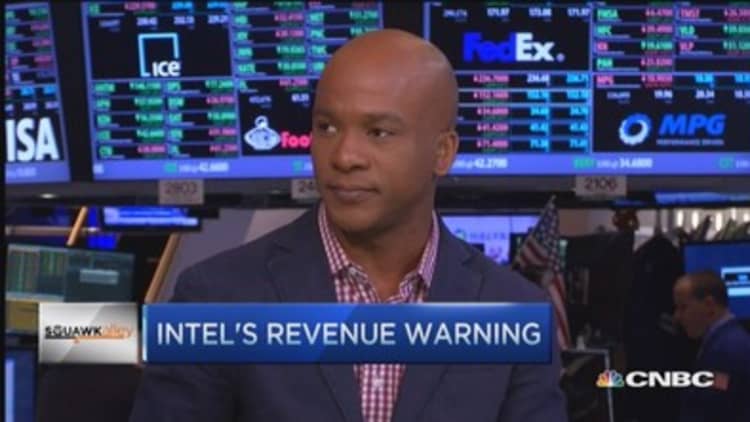
How times change.
In the not-too-distant past, a warning from microchip giant Intel that its quarterly revenue would be almost a billion dollars lighter than it previously thought would tank the broader market.
And indeed, the last time the company did cut its revenue forecast—in September 2012—it did hit the market. Then, when the company said revenue would be light by $600 million, Intel shares went on to lose 19 percent over the next two months and the S&P 500 pulled back by more than 10 percent over the same period.
Today? Not so much.
The chipmaker said Thursday it expects revenue for the quarter will be $12.8 billion, plus or minus $300 million. Its previous expectation had been $13.7 billion, plus or minus $500 million.
Read More Intel warns, businesses not upgrading PCs
After the company's announcement, the was up nearly 1 percent Thursday afternoon. Intel's stock dropped 5 percent at the opening before recovering somewhat.
Part of this reflects the diminishing importance of the traditional hardware business—where, despite the shift to mobile and wearables, the bulk of its business still is.
In the fast growing smartphone chip market dominated by Qualcomm, Intel has hardly been a player, and the company has largely bought its way into the tablet market by selling at a loss.
Hardware "used to be a very important indicator," said Frank Gillett, VP and principal analyst at Forrester Research. Now, smartphones and software mean much more, and any sign of weaknesses in those sectors will have a much bigger impact, he said.
Read MoreTen ways to trade Intel's drop
Intel attributed its lowered guidance to macro trends and to a delayed upgrade cycle that stems from small and medium-sized businesses clinging to a 10-year-old Windows XP operating system, which is no longer supported by Microsoft and has known security flaws, said Gillett.
The company may have "overestimated the rational behavior of humans," he said.
The fact that Microsoft's Windows 10 won't come to market until later this year—thus hastening the upgrade cycle—will also hurt Intel in the near term, said Alex Gauna, an analyst at JMP Securities, who recently downgraded the stock to "underperform."
"There are a lot of forces working against them," Gauna said.
Read MoreGood intel: Smart bet on Intel yields big profits
And Intel's cloud business, which the company insists is healthy, is now more dependent on big concentrated cloud vendors like Amazon, Google and Apple to update their servers. The problem is that those companies are waiting to do that until better servers come out near the end of this year.
"They have missed in mobile, they were late with a somewhat questionable strategy in wearables and so the problem is where do they go for growth, and as they try to find that, where they can get growth, they are losing a lot of money," Gauna said.
—CNBC's Ari Levy and John Melloy contributed to this report.



